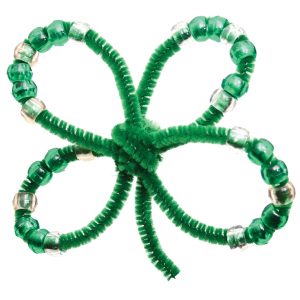 What you need:
What you need:
- Three green pipe cleaners
- One pair of scissors
- Assorted beads (We used 16 green and 12 white beads!)
- Three green pipe cleaners
- One pair of scissors
- Assorted beads (We used 16 green and 12 white beads!)
What to do:
- Cut two pipe cleaners in half, so you have four pieces.
- String beads onto each pipe cleaner piece. (We added seven beads to each pipe cleaner.)
- Fold pipe cleaner into the shape of a leaf and twist ends together.
- Repeat the second and third steps with remaining pipe cleaners.
- Cut the remaining pipe cleaner into thirds.
- Arrange the four leaves into a four-leaf clover position.
- Use two of the small pipe cleaner pieces to connect the four leaves.
- Wrap the third pieces around the center and pull through the bottom to make the stem.
Why are four-leaf clovers considered lucky?
Today, four-leaf clovers are associated with St. Patrick’s Day, but they appeared in early legends as symbols of good luck.
In the early days of Ireland, Celtic priests carried three-leaf clovers, or shamrocks, to help them see evil spirits coming toward them. Thus, they had a chance to escape. Four-leaf clovers were believed to offer magical protection and ward off bad luck.
Children in the Middle Ages carried four-leaf clovers in an attempt to see fairies.
Did you know these fun facts?
- There are no clover plants that naturally produce four leaves, which is why four-leaf clovers are so rare. About one out of 10,000 three-leaf clovers ends up with four leaves, instead of the usual three.
- The four leaves are said to stand for faith, hope, love and luck.
- Ireland is known for being home to more four-leaf clovers than any other place, giving meaning to the phrase “the luck of the Irish.”
Source: Better Homes and Gardens



